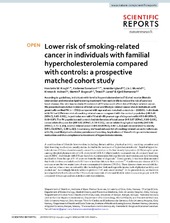| dc.contributor.author | Krogh, Henriette Walaas | en_US |
| dc.contributor.author | Svendsen, Karianne | en_US |
| dc.contributor.author | Igland, Jannicke | en_US |
| dc.contributor.author | Mundal, Liv | en_US |
| dc.contributor.author | Holven, Kirsten Bjørklund | en_US |
| dc.contributor.author | Bogsrud, Martin Prøven | en_US |
| dc.contributor.author | Leren, Trond Paul | en_US |
| dc.contributor.author | Retterstøl, Kjetil | en_US |
| dc.date.accessioned | 2020-05-11T09:16:09Z | |
| dc.date.available | 2020-05-11T09:16:09Z | |
| dc.date.issued | 2019-12-17 | |
| dc.Published | Krogh H, Svendsen KS, Igland J, Mundal LJ, Holven KB, Bogsrud MP, Leren TP, Retterstøl K. Lower risk of smoking-related cancer in individuals with familial hypercholesterolemia compared with controls: a prospective matched cohort study. Scientific Reports. 2019;9:19273 | eng |
| dc.identifier.issn | 2045-2322 | |
| dc.identifier.uri | https://hdl.handle.net/1956/22177 | |
| dc.description.abstract | According to guidelines, individuals with familial hypercholesterolemia (FH) shall receive lifestyle intervention and intensive lipid-lowering treatment from early in life to reduce the risk of coronary heart disease. Our aim was to study if treatment of FH also could affect risk of lifestyle-related cancer. We presented cumulative incidence of total cancer and lifestyle-related cancer sites in individuals with genetically verified FH (n = 5531) compared with age and sex matched controls (n = 108354). Individuals with FH had 20% lower risk of smoking-related cancer compared with the control population [HR 0.80 (95% CI, 0.65–0.98)], in particular men with FH at 40–69 years at age of diagnosis with HR 0.69 (95% CI, 0.49–0.97). The FH population and controls had similar rates of total cancer [HR 0.97 (95% CI, 0.86–1.09)], cancer related to poor diet [HR 0.82 (95% CI, 0.59–1.15)], cancer related to physical inactivity [HR 0.93 (95% CI, 0.73–1.18)], alcohol-related cancer [HR 0.98 (95% CI, 0.80–1.22)] and cancer related to obesity [HR 1.03 (95% CI, 0.89–1.21)]. In summary, we found reduced risk of smoking-related cancer in individuals with FH, most likely due to a lower prevalence of smoking. Implications of these findings can be increased motivation and thus compliance to treatment of hypercholesterolemia. | en_US |
| dc.language.iso | eng | eng |
| dc.publisher | Springer | eng |
| dc.rights | Attribution CC BY | eng |
| dc.rights.uri | https://creativecommons.org/licenses/by/4.0 | eng |
| dc.title | Lower risk of smoking-related cancer in individuals with familial hypercholesterolemia compared with controls: a prospective matched cohort study | en_US |
| dc.type | Peer reviewed | |
| dc.type | Journal article | |
| dc.date.updated | 2020-02-03T13:16:54Z | |
| dc.description.version | publishedVersion | en_US |
| dc.rights.holder | The Author(s) 2019 | |
| dc.identifier.doi | https://doi.org/10.1038/s41598-019-55682-x | |
| dc.identifier.cristin | 1786580 | |
| dc.source.journal | Scientific Reports | |

